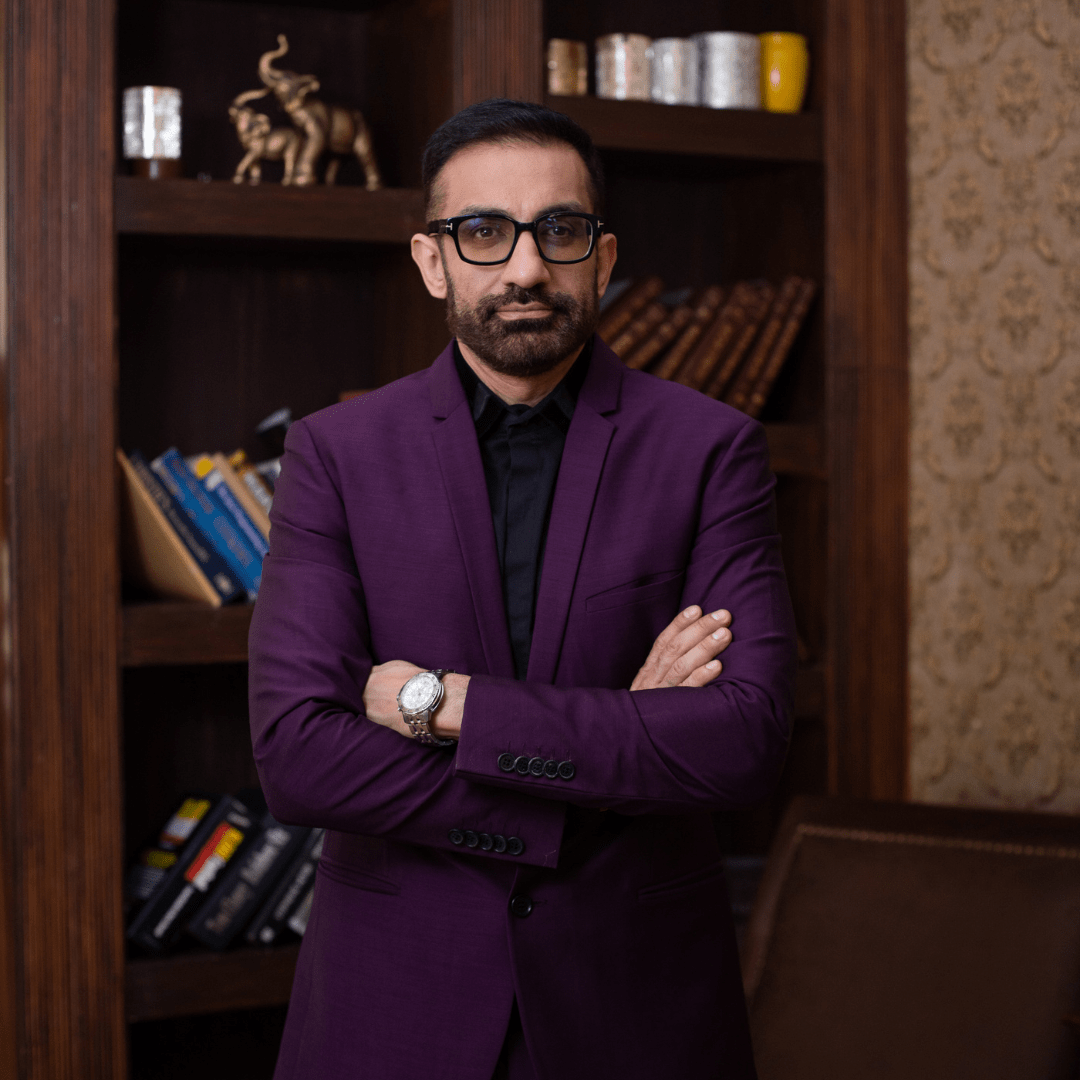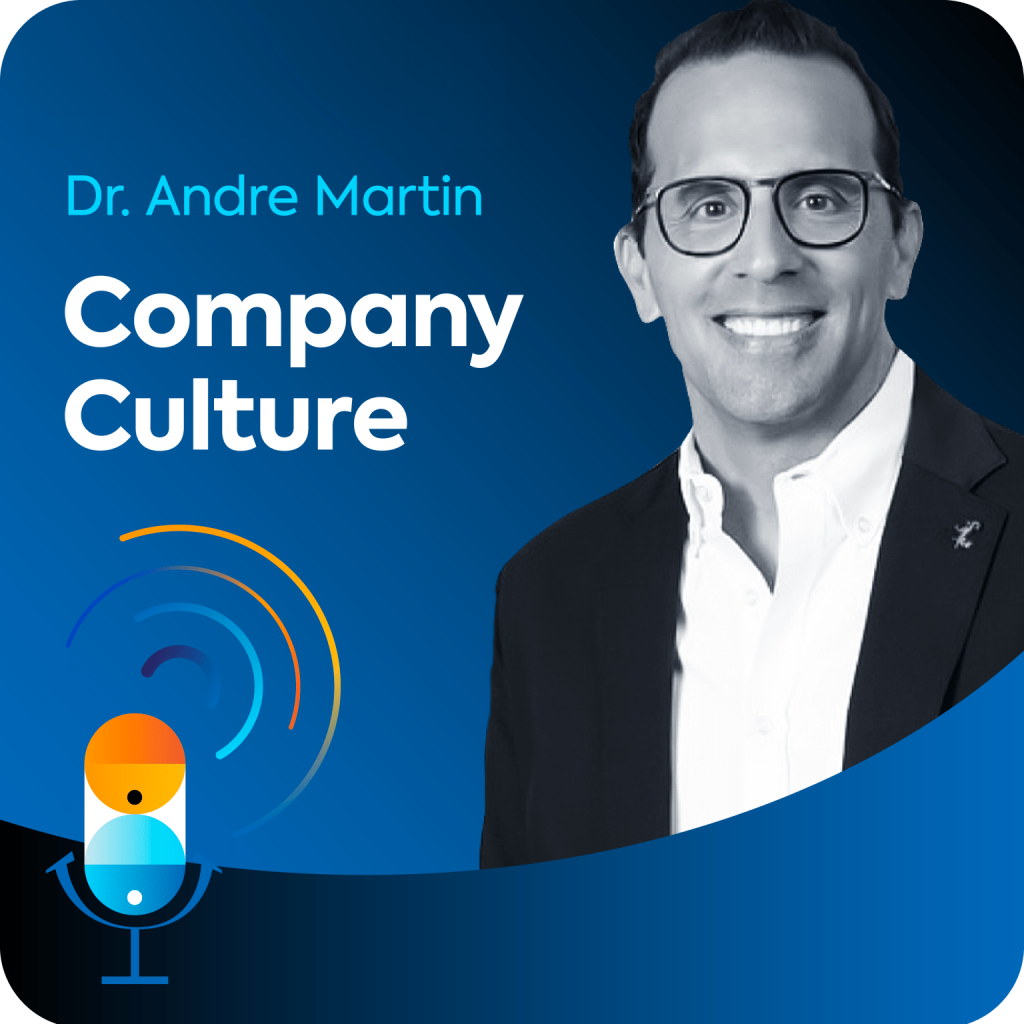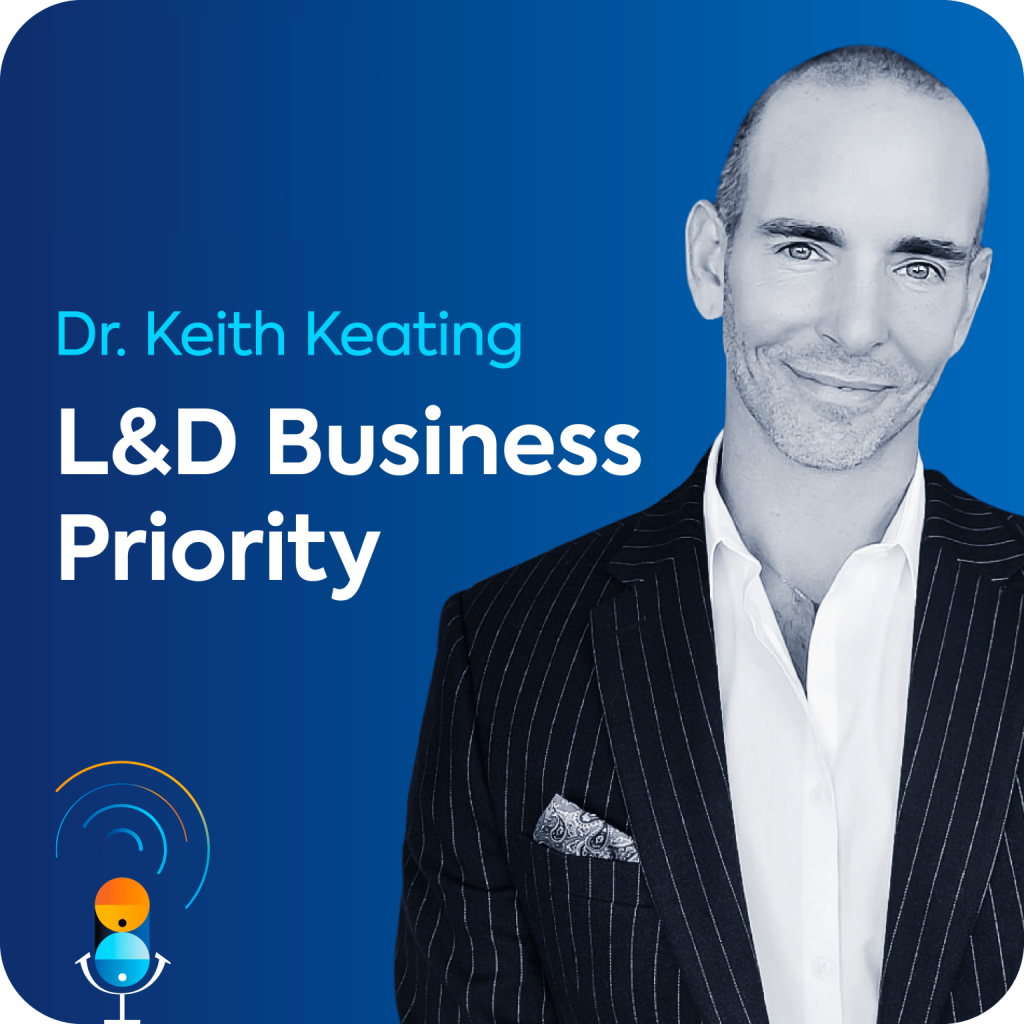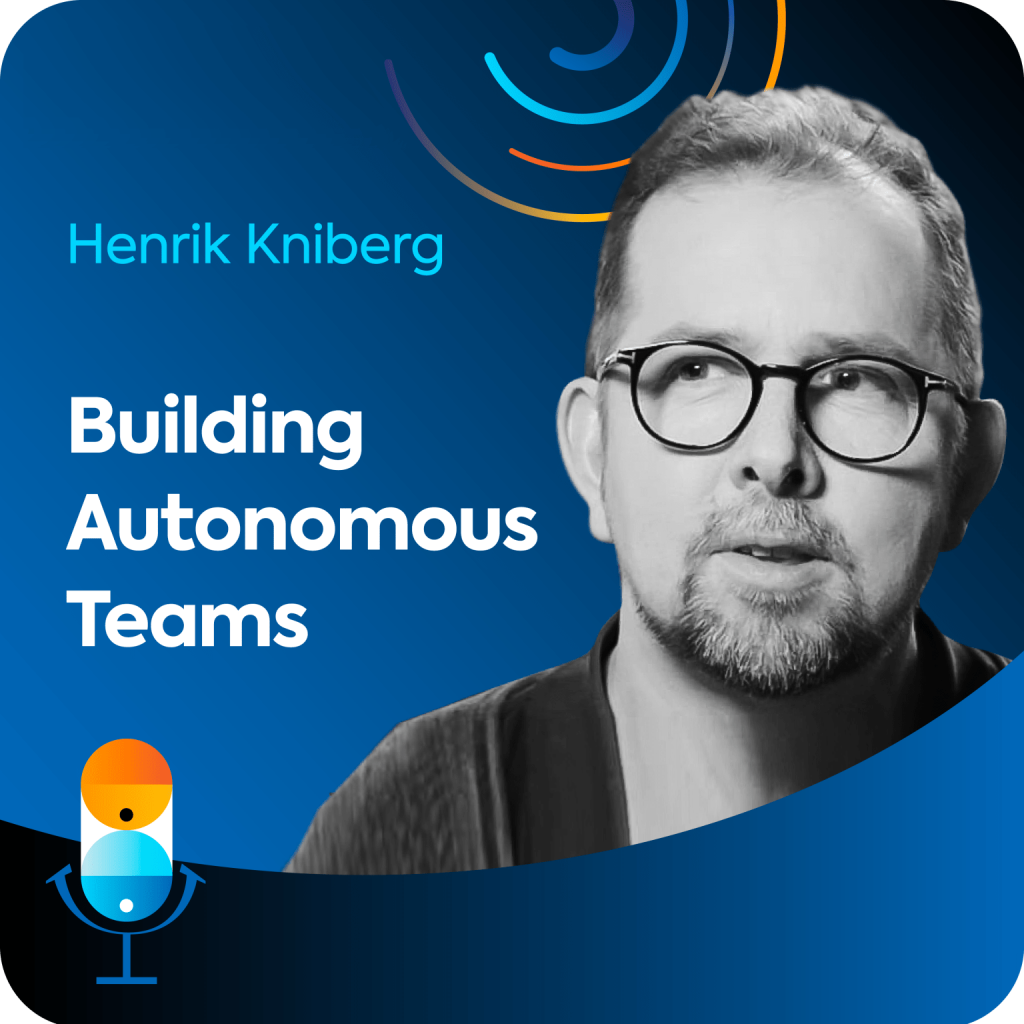Episode 18: Mastering a growth mindset
and cultivating it in your workforce
Duration: 38min
About our guest:

Nikhil Arora
Nikhil Arora is a seasoned executive with over 25 years of experience driving business transformation across industries, with a strong focus on SaaS solutions for SMBs.
As the former CEO of Epignosis Learning Technologies, he contributed to the growth of TalentLMS. He has also held leadership roles at GoDaddy, WeWork, Intuit, and ADP, where he successfully expanded markets and drove global growth. A committed advocate for SMBs, Nikhil is deeply passionate about the transformative power of learning.
Share episode
How can we escape the fear of failure and celebrate experimentation rather than just the result? In this special episode, Nikhil Arora, shares his tips on how to commit to a growth mindset in both personal and professional life.
He opens up about the importance of depersonalizing failure and why he thinks vulnerability is an essential leadership quality. We also learn what organizations can do to keep a culture of consistent learning alive. Plus we reveal TalentLMS’s latest research into the benefits of a growth mindset and their impact on training.
Key takeaways:
Growth is in the journey, not the destination. Success isn’t always about the final result. The focus is on the process. A true growth mindset empowers employees to embrace challenges, learn from failures, and prioritize continuous improvement.
A culture of growth starts at the top. Leaders set the tone for growth. They should model vulnerability, celebrate experimentation, and create a safe space for making mistakes. This encourages their teams to innovate and push boundaries.
Innovation starts with having the right mindset. Creating a growth-oriented culture means fostering innovation at all levels. Organizations should measure success by how many new ideas they want to try. Because in a fast-paced world, it’s the experimenters who win.
Learning is the heartbeat of growth. A thriving growth mindset requires a culture of continuous learning. It’s essential to invest in personalized learning paths, reskilling, and upskilling to create agile, adaptable, and future-ready teams.
More episodes we think you’ll love

January 31, 2024 • 38 min.
•
People Management | Learning & Development
Defining & Decoding Company Culture
What is company culture? Is it ping-pong tables and perks? Is it the values we talk about internally? Or is it the way the company works “on a random Tuesday in October”? With experience at Disney, Nike, and Google, Talent Exec, Andre Martin joins the discussion. Join us and find out why authenticity and intention lie at the heart of a consistent culture.

August 28, 2024 • 31 min.
•
People Management | Learning & Development
Championing L&D’s true value: Making learning a business priority
How can L&D overcome the 3 biggest challenges facing companies today? Why’s L&D failing to get approval from the C-suite? Dr. Keith Keating, the award-winning author of “The Trusted Learning Advisor” joins us to answer these questions. Plus, we cover how to create a culture where L&D’s value isn’t just a number, and the critical importance of positioning yourself one step ahead of tech trends.

October 11, 2023 • 30 min.
•
Organizational Design | People Management | Learning & Development
Squads, Scrums and Spotify
How can autonomous squads and agile principles unleash the potential of our teams and help businesses scale? We chat to Henrik Kniberg, the coder-turned-consultant, who’s coached teams at Minecraft, Lego and Spotify. Henrik takes us behind the scenes of Spotify’s early days when the start-up dared to implement agile strategies at scale. We also break down how leaders can stop micromanaging and actually lead, and explore how businesses can adopt new ways of working.

Never miss an episode! Get every new drop right in your inbox
Full Episode Transcript
[00:00:00] Host: Welcome to Keep It Simple, a podcast where we’re challenging business and leadership experts to cut through the noise of the corporate world and get to the bottom of what makes the workplace actually work. I’m your host, Mina Vogia. Keep It Simple is brought to you by [00:00:30] TalentLMS. The training platform built for success and designed with simplicity in mind.
[00:00:36] Together, let’s uncomplicate what makes a winning workplace. You can find out more at talentlms.com.
[00:00:48] On today’s episode,
[00:00:49] Nikhil Arora: One thing I’ve learned is every employee wants to grow as a human being. There’s not one person you ask, Hey, do you want to grow? Of course. But it’s the how, right? And as, as a [00:01:00] leader, as a company, if you create these conditions of growth, where we are pushing them, but also saying that it’s okay to fail, we are reskilling them, upskilling them because they want to get reskilled, upskilled, but perhaps, you know, they don’t have the time or the opportunity to do that.
[00:01:16] Host: What does it mean to truly have a growth mindset, and how can leaders cultivate a culture that ensures their business isn’t fixed in position, but constantly improving? In this special episode of Keep It Simple, we sit down with the [00:01:30] CEO here at Epignosis – the parent company of TalentLMS – Nikhil Arora. Before joining us in 2023, he led global giants like GoDaddy and WeWork and spent over two decades helping companies grow across a number of industries and continents. With all this experience, he’s the perfect guest to share the proven practices that leaders can use to create an environment where continuous learning isn’t just encouraged, but embedded into the DNA of an organization. Stay [00:02:00] with us.
[00:02:07] So Nikhil, it’s so great that you found time in your busy schedule to sit down with us. I’m really excited for this interview. How are you today?
[00:02:15] Nikhil Arora: I’m great. And I’m really excited to do this interview because it’s one of my favorite topics.
[00:02:21] Host: The growth mindset. And I know that’s something that you apply in your personal and professional life.
[00:02:27] Is that correct?
[00:02:28] Nikhil Arora: Yes. It’s been ingrained [00:02:30] in me through childhood. And It’s really made a huge difference in how I look at things and how it’s made me evolved as a person and in my professional life.
[00:02:39] Host: That’s amazing because the growth mindset is a term that’s sort of been thrown around over the past few years a lot, but I would love to get your definition of the term.
[00:02:49] And if there was ever a particular moment in life that made you lean into it more and then apply it in your personal and professional life.
[00:02:59] Nikhil Arora: So [00:03:00] there’s, there’s this great book called, uh, by Dr. Carol Dweck, and it’s about growth mindset, and it’s a very simple book and has some very powerful examples. And, you know, when I read that book, it helped me connect to what I knew was a growth mindset, but not that powerfully well.
[00:03:16] And I’ll give you an example from my childhood, right? You know, every time. When you come home, and you do well in school, your parents would obviously, you know, give you a big kudos, and you will, you know, get some sort of a reward or a toy or, or [00:03:30] something you wanted. And, you know, what I always used to get was recognition for the process, not the outcome.
[00:03:36] Right. So if you come first in your class, which I never did, but if you do, or you do something well in sports and you win a medal. You know, I would be always kind of recognized and rewarded for putting in the hard work, putting in the discipline, not about the medal or the first award, right? And I didn’t understand then what it meant.
[00:03:57] And when I, you know, read the book by Dr. Carol [00:04:00] Dweck, she actually has a couple of examples which, which actually helped me relate to that, that it’s, what I’m being rewarded for is my mindset. To go and and try things and the way she explained in the book was that if you are recognizing the outcome. Oh, I’m so proud of you because you came first or I’m so proud of you because you won this medal.
[00:04:22] You are actually creating a bit of a fixed mindset because what you’re doing is you’re now creating a mindset where [00:04:30] the reward and success are based on the end result versus the process, right? And so if you get so fixated on I need to come first, I need to get the medal, you will always try things in life which will get you the medal or the first place and you will fear failure where you were not going to get those. And so you’re kind of migrating towards a fixed mindset. So the difference is, um, that recognizing if you getting fixated by the outcome, [00:05:00] you’re going to be more fixed mindset because you’re going to be having a higher fear of failure versus, you know, growth mindset is about, I’m going to embrace uncertainty and I’m going to embrace change.
[00:05:12] And I’m going to put in the process, put in my hard work. And let the outcome be what it’s going to be.
[00:05:18] Host: And basically with the fixed mindset, you’re always looking at the goal and never really focusing on the things that you can learn through the actual journey and process, [00:05:30] which I think that’s where most of our growth comes from.
[00:05:33] Like, right, it’s usually the journey and not necessarily the destination.
[00:05:37] Nikhil Arora: Yeah, which is also being in the present, right? Because most of the time in life, either we are in the past or we’re in the future. That, you know, past is about, okay, I’m, I’m, I’m, I’m worried about, or, you know, I’m being affected by perhaps the failure.
[00:05:51] The future is the outcome of the goal, but the real thing is happening in the present, which is the process.
[00:05:58] Host: That’s a great way of thinking [00:06:00] of it. And why do you think now more than ever, it’s important for employees and leaders to really try to instill this growth mindset?
[00:06:09] Nikhil Arora: You know, one of the, one of the recent surveys we have done talks about, that if the leaders embrace the growth mindset, 92 percent of the organization actually really looks at leading by example, right?
[00:06:24] And, and so it starts with the leader. And it’s more so now than in the past, [00:06:30] because one, I think there’s a clear recognition of what a fixed or growth mindset means. I think there’s much more clarity now than perhaps in the past. It’s also because, you know, it’s such a hyper-busy world with so much great technology with so many things to do and kind of potential has become unlimited and where in the past, you know, it was more of a world of constraints.
[00:06:53] And, so applying the growth mindset becomes important because, you know, you got to pick and [00:07:00] choose those lanes where you can possibly win or have a higher odds of winning, but also a hyper-competitive world requires a hyper-competitive mindset, which requires embracing a lot of uncertainty.
[00:07:12] And I think we’re dealing with a lot of uncertainty over the last decade, right? Macro economically. COVID, business conditions, and so when the world is in a high degree of uncertainty, what will separate the winners from the ones who are not going to win is the mindset and [00:07:30] where the fixed mindset will be staying in the comfortable zone.
[00:07:33] You know, if you’re a company, think about, yeah, my product is working well today. What do I need to do more? Nothing, right? Just keep doing my incremental improvements versus somebody’s going to come in and come up with a much faster, bigger, uh, evolution or innovation of your product, create a new go-to-market model.
[00:07:52] And before you know, you become irrelevant, right? So growth mindset in a world of uncertainty in a hyper-competitive environment [00:08:00] becomes almost the differentiator between winning and losing.
[00:08:04] Host: I also understand the growth mindset in a way of basically being able to shut everything else out, all the other stimuli that we have in our everyday life.
[00:08:14] And with a growth mindset, you’re sort of able to silo yourself and just focus. It’s one thing being aware of your own mindset as an employee or a leader, but how can an entire organization be said to have a growth [00:08:30] mindset? Are there any specific indicators that we can pinpoint and say, oh, that company, they’ve got a growth mindset, and they are following through with it?
[00:08:40] Nikhil Arora: Certainly. And I just want to kind of build upon what you just talked about, uh, you know, this world of heavy distraction and, and so many options, right? Sometimes, too many options is also not the best place to be, especially if you have, you know, a mindset, which is, Hey, let me go after this. Let me go after this.
[00:08:58] Let me go after the [00:09:00] next shiny penny. You know, the hardest thing in life is to decide what not to do, because we always know what we want to do with the variety of options, but sitting down and making a list of, I’m not going to do these four or five things, an exercise in your personal and professional life is so revolutionary to your own self to say that I’m writing down, I’m not going to, like, for example, if you have 10 products in a company, oh, yeah, I’m going to do one product two product.
[00:09:25] I’m going to win on all. I’m going to do this. Why not? Right? Because somebody is winning in these 10 [00:09:30] products in the industry, clearly, and you would always push yourself. Why can’t I do it? But in reality, you know, given the constraints you have given the core competencies you have given the capabilities you have that you can only win in these three, and I’m not going to do the other seven, you know, that’s, that’s very very basic, but when you come down to applying that it becomes again a differentiator between successful companies and not so successful [00:10:00] companies.
[00:10:00] So there’s a spiritual angle to this when you talk about the concept of minimalism and essentialism which essentially means that it doesn’t mean you’re lowering the bar, what you’re doing is you’re defining, you know here are the three things that are going to get me my 80% of results. The mindset starts from really being very clear on what you’re not going to do. Your question about how can you measure what are the fact, you know, kind of key metrics within the organization. So think of, you know, if [00:10:30] you’re trying to create a culture of growth mindset, so how many new innovations are you creating in the company, whether they could be process innovation, they could be product innovation, they could be marketing innovations, but like, for example, I always think of every year if you measure your own results at the end of the year.
[00:10:50] Have you got 2025 percent revenue from something new you have done? It doesn’t necessarily mean new product, but you have done new innovations [00:11:00] on how you’re acquiring the customers or how you’re serving the customers. Or number of failures you may have in the company. That’s also a sign of embracing uncertainty.
[00:11:10] I’m going to put out 20 experiments, and 18 are going to fail, but I’m putting 20 experiments, which would have been in a fixed mindset, zero, right? And then also your employee skilling, you know, you measure each year that this is my baseline of current skill sets of my employee. How much have I improved over the [00:11:30] year for every employee, right?
[00:11:31] Are there 10 percent more, 20 percent more, 30 percent more? That’s again a path towards growth mindset because you could argue that, hey, what skills I have in one year, if I change nothing, would my business crash? Probably not, but that’s fixed mindset. But you know, in two years from now, it perhaps will start affecting your business or three years from now.
[00:11:50] So are you investing a growth mindset on skilling people so they are now two years ahead, three years ahead. And then lastly, cross-functional [00:12:00] movements. So you always want your employees to be able to have ability to learn different functions. So how many employees went from one function to the other, even if it was a short time, right?
[00:12:10] Whether from sales to marketing or marketing to product, product to finance, because you’re again, pushing them beyond the boundaries. One thing I’ve learned is every employee wants to grow as a human being. There’s not one person you ask, Hey, do you want to grow? Of course, but it’s the how, right? And, as a leader, as a [00:12:30] company, if we create these conditions of growth, where we are pushing them, but also saying that it’s okay to fail, we are reskilling them, upskilling them because they want to get reskilled, upskilled, but perhaps, you know, they don’t have the time or the opportunity to do that.
[00:12:44] So I think the leaders, the companies can create that environment and the growth mindset, you know, can start getting measured.
[00:12:52] Host: I definitely want us to come back to the managers and the leaders of an organization and how they can influence the growth mindset. But [00:13:00] before that, I want us to take the example of an SMB where it might have about 100 employees.
[00:13:07] What are some first steps that they can try in order to shake up their entire workforce approach when it comes to tasks and work?
[00:13:17] Nikhil Arora: I’ve worked with SMBs across the world for over now two decades, and what’s consistent is their time constraint and their money constraint, meaning a small business has only limited resources and they’re [00:13:30] trying to do everything, right?
[00:13:31] If you look at a small, uh, medium-sized business where they wear multiple hats, right? They’re trying to do finance, marketing, sales. I mean, they spread themselves, you know, pretty thin, but that’s how an SMB is. They’re also tight on money, right? Because you only have so much money and, you know, unlike a large enterprise.
[00:13:49] So you, uh, you’re trying to prioritize and allocate in a very, uh, you know, limited fashion. So if you think about an SMB where the employees are, let’s say you [00:14:00] talk about 100 employees, you have a limited number of employees. The first place is what I call skills assessment, right? I’m going to go back to what really TalentLMS does.
[00:14:09] And it’s amazing how basic it is, but how powerful it is to make a skill assessment of your employees. Because a lot of times. In this noise of, you know, kind of high technology, new modules coming out, everybody wants to learn everything, but the starting line needs to be very different for everybody.
[00:14:29] [00:14:30] So the skill baseline assessment of where your employees stand is a very small and a very affordable process because, you know, with, with, with, with products like ours, you’re, you’re able to do that assessment and say, okay, where do you stand on a kind of scale of one to 10? And, where do you want to get that right?
[00:14:47] Once you’ve done that, then I think you have a clear mapping or how do you get them, you know, to what their next level will be. And again, everybody’s levels are going to be different. And that’s where mapping the right [00:15:00] content. Going back to, you know, what we do, I think, relevant content, personalized learning, because everybody learns differently, right?
[00:15:07] So for SMB, it’s a very critical area because they only have limited employees, and the impact is a lot more than an enterprise where, where I would say in an enterprise, you know, your single points of failure are very low. Because you have a large organization, very structured processes. At an SMB, your single point of failure is a, you know, a very [00:15:30] like, they’re only three or four.
[00:15:31] And if you get them right, you’re great. If you get them wrong, You could be really, you know, kind of suffering in business. So making sure that, you know, you’re doing the skills assessment, you’re mapping the right content to them, doing the right, you know, personalized learning at an affordable price they need because obviously the economics are important, right?
[00:15:51] So that’s where the selection of how you’re going to scale people, what, you know, product you’re going to use, what content you’re going to use becomes [00:16:00] very critical because you only do it once. And you want to make sure, you know, you’re doing it right.
[00:16:05] Host: I would imagine that a big part of the skill assessment, which is as you mentioned, the base of a growth mindset at this point, or at least adopting it.
[00:16:15] A big part of it, I can imagine is a little daunting to the actual employees who are getting assessed. And in order to take risks and for people to grow, as you mentioned before, they have to have that [00:16:30] environment where fear and stress aren’t the leading emotions. So how can leaders reduce that stress and provide more work environments where risks are welcome?
[00:16:42] Nikhil Arora: That I think, starts with leadership, right?
[00:16:46] It again, goes back to creating a growth mindset, which means cultivating a culture of celebrating failures, cultivating a culture where leadership leads by example, and be vulnerable. [00:17:00] And that’s what we used to do in one of my previous ventures that we would, like at every all hands, we would celebrate failures, and we have trophies for failures, you know, because we always have trophies for celebration, but, you know, because this matters, right?
[00:17:13] When you’re in an open environment celebrating failures, but what you’re celebrating is, you know, the mindset and the courage. And the will to take a risk and do something and learn something and try to innovate something and it didn’t work, but that was just the outcome.
[00:17:29] Host: So [00:17:30] you also had awards of like most creative failure.
[00:17:32] Nikhil Arora: Yeah, we kinda created this, you know, kind of a competition on different categories, right? And, and that itself created a, you know, very, you know, lighthearted way of marketing creativity, right? Because what should I name this, right? Because it would be like, Hey, I’ll name this. I’ll name this. And people will look forward to it over time because then the failure suddenly meant something different, right?
[00:17:57] It was a lighthearted and also [00:18:00] already the word got a different meaning to it.
[00:18:03] Host: A big part of that, I also understand, is continuous learning. It’s something you mentioned earlier as well, and I know that you’re a big advocate for it. In some roles industries and teams, this can feel quite hard and unrealistic.
[00:18:16] So how can organizations and leaders within those organizations foster a culture of continuous learning.
[00:18:25] Nikhil Arora: It goes back to the values, right? If you think about it, every company has a set of values and [00:18:30] first principles they operate by. And so let me give you an example of some of the values, which could be like, you know, be bold, learn fast, be accountable, work together.
[00:18:40] And so the values, if you look at across all companies, I don’t think there are any values which you can recreate, right? These values are out there, and there’s nothing revolutionary in there. The importance of value comes in a, it’s declared as a value and more importantly, it’s a living, breathing part of the company culture.
[00:18:59] So if you [00:19:00] say continuous learning, right, which is learn fast, fail fast, you want to institute that. And how does that happen, right? You, you make sure that like, hey, as in every employee, there’s a metric that 20 percent of your path is going to be about new learning. So in the mid-year review, end of the year review, you are actually measuring that to say, hey, how, like if you’re in marketing, like what are the one or two new things you learned around, you know, related [00:19:30] to, you know, kind of performance marketing, brand marketing or product marketing, but you are putting it as a goal.
[00:19:35] Which is measurable in quantitative terms and qualitative terms, but the onus comes back on the manager because the manager needs to enable that, embrace that, create that condition of safety we talked about before, and the manager and leaders actually role model it, right? Because like, what have I learned as a leader Today?
[00:19:54] I should also be able to have my scorecard. So one of the things I used to do in my previous [00:20:00] companies was, have my own scorecard in front of my leadership team to say, here, here’s what my scorecard is. What is my red? What is my yellow? What is my green? And so that creates transparency that creates that condition of safety and psychology because hey, I’ve also failed in some places, but it’s okay.
[00:20:18] I’ve recognized, but I have, you know, I kind of need to do better. So I think continuous learning a) needs to be declared as a value, b) there should be a process. So it’s being measured. It’s been executed. Your [00:20:30] managers are being held responsible for their employees. So it’s just not the employee, but Yyu hold the manager accountable, you know, the general rule of thumb, I always believe is that, you know, at least 20 percent should always be new, new, whether it’s about a, you know, a new process about something, new innovation about new learning, new skill, because it’s, it’s doable.
[00:20:50] It’s not crazy.
[00:20:51] Host: Yeah. I did want to share something, a bit of a personal, let’s call it anecdote to lead us into the next [00:21:00] question where basically, I feel like now I sort of identify as a social butterfly, but that wasn’t always the case for me. There was a time, especially in school, where I would raise my hand and preemptively go beat red, and I would mumble my words.
[00:21:18] So there was no reality in which I would be hosting a podcast or openly just socially talking to people. And I wanted to improve it, so I took the [00:21:30] time. And I went through a grueling process of talking in front of a lot of people, and I eventually even reached the point of teaching public speaking at a competitive level.
[00:21:41] So, I believe that you can really learn anything, you can improve anything. But I’ve come across a lot of individuals with that kind of fixed mindset that sort of doubted me because I was shy or because I perceived learning in a different way than most. [00:22:00] So I would love to get your thoughts on the argument that perhaps some people simply don’t have the ability to perform well in certain situations.
[00:22:09] Do you believe that anything and everything can be learned with a growth mindset? I know that was a long-winded way of getting to the point.
[00:22:17] Nikhil Arora: No, I think it’s a great example. And, uh, you know, congratulations to you for being able to first recognize, you know, what your constraints were and then embrace that and actually, you know, come to a level that you can actually [00:22:30] teach a skill which you were so scared of, right?
[00:22:32] And I think that’s a perfect example of what a mindset can do if you’re able to accept where it is now. I think I go back to the example of that preserving, creating, destroying analogy, right? And so, not everybody is a creator. The human nature, all of us are meant to be creators. Like if you look at the most joyous moments of your life, it’s about creation.
[00:22:56] You’ve created something small or whether it’s process [00:23:00] product, anything, but the degree at which we feel comfortable is very different. And it changes over your life because you get less risk averse. Right? So I think the way you approach is the preservers, right? Where things are working well but they can get better. You create conditions for them to still grow, but again, they’re not going to go from, you know, kind of a fixed mindset to a super hyper-growth mindset quickly [00:23:30] because that’s how their conditions, you know, life has kind of given them different learnings and so you’re trying to unpack a lot, right?
[00:23:37] But nevertheless, you can still move them forward, right? Where the creators are absolutely, you know, the growth mindset one, right? Because they thrive on uncertainty. They thrive on, you know, things which are highly likely to fail, but they want to still try it. And, so there you have a different problem, right?
[00:23:56] But I think if I understand the question correctly, is that, [00:24:00] is mindset the answer for, you know, changing? And again, what’s behind the mindset, right? You have to understand behind the mindset is life experiences. Your conditions which were given to you, and if you are able to create the conditions differently, I think you will have that have them evolve more the speed at which they evolve is going to be different from somebody who had you know more conditions of like for me like, you know, I’ve traveled lived in so many countries and worked in so many companies [00:24:30] so I’m okay to land from one place to the other and go from one company to the other and one culture to the other.
[00:24:35] And, you know, it’s, it’s become more natural. Somebody who had hadn’t had this, you know, kind of gift or a blessing of doing this is, you know, so that was their condition, but how can we as leaders, right, if you think about skilling again, going back to everybody wants to learn, it’s just that their degree of comfort or degree of, uh, uncertainty is different.
[00:24:55] So, you know, create those conditions, but map out that, that’s [00:25:00] where the personalized learning comes in. And that’s why, going back to TalentLMS, right? Like our content, whether it’s soft skilling or hard skilling, you can progress at your own pace and the outcome is the same, but your pace of learning is different.
[00:25:17] And that’s what, you know, the beauty of a good product or good content and good learning platform comes in. And it’s kind of not giving a single path, right? There are multiple paths to the same outcome.[00:25:30]
[00:25:35] Host: We’ll get back to our chat with Nikhil in just a second, but first, we wanted to share some stats from a recent TalentLMS survey, which dug a little deeper into what growth mindset can do for an organization. The bottom line is, it’s important. 9 out of 10 executives believe that future business success will depend on leaders who embody a growth mindset.
[00:25:58] And as we’ve heard, [00:26:00] developing a growth mindset in your team or organization is all about creating a culture of continuous learning and innovation. So start by promoting a learning environment where knowledge is accessible and valued. Invest in the right tech infrastructure, like TalentLMS, that makes learning quick and easy.
[00:26:20] Our report also found that one of the key obstacles for employees developing a growth mindset is fear of failure. So make sure to create a space where risk is rewarded [00:26:30] and failure is normalized. Reward progress through personalized feedback, public praise, intangible incentives, like bonuses or career advancement opportunities, celebrate achievements, both big and small, with team events and awards.
[00:26:46] And finally, 9 out of 10 executives believe that the most important thing in promoting a growth mindset is leading by example. So embrace vulnerability, demonstrate resilience, and show your team that learning and [00:27:00] growth are part of the journey to success.
[00:27:06] So now I would love for us to talk about a recent TalentLMS survey that’s just been published on the growth mindset, and it found that 96 percent of executives believe that they have a growth mindset. And however, less than half of employees agreed that executives often or always demonstrate a [00:27:30] growth mindset.
[00:27:31] So there’s a disconnect here, and I want us to shed some light onto it. As a leader yourself, what practical things can be done to show these qualities? Before you also mentioned the scorecard, and that you show them exactly what it is you’re, you’re working on, what you need to improve, and what you’re actually good at.
[00:27:51] What are some, some other methods that leaders can use?
[00:27:56] Nikhil Arora: So from a leadership point of view, one is to kind of really, [00:28:00] it’s, it’s about self-assessment versus what others are assessing you. And that’s the gap you’re talking about. And I think it’s important to understand, is it a, is it really authenticity issue because I could say I’m a growth mindset and then I go in my room, and then I’m done and I’m all fixed mindset all day, you know, that’s authentic authenticity issue, which is a different problem.
[00:28:20] But that’s, you know, the individual has to, you know, kind of address it. Uh, but if it’s a role modeling or communication or an issue where [00:28:30] you’re doing things, but people are not seeing things or people are embracing things or, or it’s not coming to life. You know, that’s an easy problem to solve because then it’s more of the how.
[00:28:40] You still are the growth mindset, which is the what, but the how is not coming across. And the third could be that it’s a definitional issue. Because again, as you go back to the growth mindset, again, do you need to build a shared consciousness on what is growth mindset, exactly what we’re talking about, right?
[00:28:58] That, that does [00:29:00] everybody understand the growth mindset or is it just a buzzword? And everybody has their own, you know, interpretations and, and, and, and kind of combinations of that, right? So I think as a leader, it’s a good place to do your 360 degree to say, you know, you’re trying to build a culture of growth mindset.
[00:29:17] You think you’re a growth mindset individual, you ask others, you’re not. Okay, it’s a great, great metric to start with. Now, like understanding the root cause, you know, is it that you’re not doing enough or is [00:29:30] it a communication issue or is it a definition issue? Uh, so I think it’s a fixable one, but other than if you’re not authentic, that’s a different problem.
[00:29:38] Host: In your extensive experience. Because before you talked about a leader having to be vulnerable. So I want to ask a bit of a vulnerable question. In your extensive experience, has there been something you were confident that was going to work, and that would foster a growth mindset as an end result? But at the end it [00:30:00] didn’t, and it didn’t work as well as you anticipated.
[00:30:03] Nikhil Arora: In, in a business environment, uh,
[00:30:06] Host: Or
[00:30:06] personal, you know, let’s, let’s go for it. You said that they’re correlated,
[00:30:11] right?
[00:30:11] Nikhil Arora: Yeah, they are. I mean, you know, at the, at the heart of it, you’re what you are, right? The mindset, uh, you know, applies, and I, um, I, I, I’m going to try to think of both, uh, you know, a business, a personal one, but a personal one, I, you know, I think I shared the story with my employees as well that, you know, I used to be an avid runner for many, many years [00:30:30] and I was getting bored and I wanted to, you know, evolve myself, which is a growth mindset.
[00:30:35] So I said, okay, let me, you know, try triathlons, right? And so
[00:30:39] Host: something light and easy,
[00:30:42] Nikhil Arora: it felt like, right, that was, that was the assumption reality was different. And so then I kind of signed on for, you know, an Ironman event, but I didn’t know how to swim. So that was my push towards my growth mindset, which kind of validated that.
[00:30:56] And so it forced me to learn swimming. Great, [00:31:00] right? I kind of did what I needed to do. Found some good coaches, got in the pool, and eventually started swimming well and so on. And then I signed on for this first event, which is not an Ironman, but a triathlon. And, you know, it was supposed to be in a lake, right?
[00:31:13] And so, so there were different categories there, right? So there was like the 1.9 kilometer swim, and then there was a 3.8 kilometer swim. And I was thinking, oh, maybe I should go for 3.8. I’ve done, you know, swimming in the pool for like, you know, 4,000 meters. But then I couldn’t get the [00:31:30] entry, so I said, okay, I’ll do the 1.9, right?
[00:31:31] A bit of ego kicking in, like, okay, I’ve done it, right? And here I start and 300 meters into the, into the swim, right? And it was in a dark dingy lake in middle of a city in India at that time. And like 300 meters into the swim, like something happened, right? I just, and people told me, hey, open water swimming is a bit different.
[00:31:53] You know, pool, like, okay, I’ve done it in the pool, right? There’s no big deal. 300 meters into there, something [00:32:00] happened and I struggled. I finished last. In that category, like to finish the swim. I finished it because of my will, but it was horrible, right? And, and I was trying to process like, what the hell?
[00:32:11] Like, meaning, you know, I’ve done this, but I’m in a, yeah, the conditions and everything were different. But, then ultimately I reflected back to say, my mindset was right, growth. I put myself out there. I learned it. I kind of underestimated the conditions people told me by that time I thought I was I’m [00:32:30] a skilled swimmer, not a perfect one, but okay, you know, the dark dingy lake.
[00:32:34] I said, Okay, what’s the big deal? I didn’t realize when I go in I can’t see anything down like, okay, what the hell is down there? You know, the mind starts playing the games, right? And it was an experience of, you know, a lot of humbleness to understand that mindset is important, but also, you know, conditions in which you’re going to go take your mindset is important.
[00:32:53] And so it just made me further prepare better. Ultimately, when I did the [00:33:00] Ironman, but it was really about, even when you have a mindset, you can get ahead of yourself and how to remind yourself. So I think growth mindset starts you in the right direction, but recognizing that your speed of learning, uh, your skill of learning, your, you know, your will may be there, but the skill matters, the, the condition that happened, right?
[00:33:21] So that was in the, in the personal side of stuff, right? In the business side of things, I could go back to perhaps, you know, [00:33:30] back at one of my previous employer where we were kind of trying to create a new category of product. Right? And the goal was like, we’re going to create this whole disruptive new product in the market in a category which already existed.
[00:33:44] And the hypothesis was right. The product is new, innovative, the market exists. Where we were lacking was really getting validation from the customers. We were so much into our own growth mindset in our own corridors and our own conference rooms and [00:34:00] building this great flowcharts and building all that stuff right and so making sure that you’re having a mirror in your mindset journey to remind you, you know, what’s right or wrong.
[00:34:10] So our product failed, but we knew why it failed because we were over-indexing on our ideas and our own learning versus what the market or product was selling. And so, you know, ultimately starts with the mindset, but making sure you have mirrors in that journey to make sure you’re like, this is an [00:34:30] example of when you got into a fixed mindset, right?
[00:34:31] We started with a growth mindset, but the fixed mindset came in because it’s our idea, our process, part of the ego, our knowledge, but ultimately who’s going to consume it?
[00:34:41] Host: Thank you so much for sharing those stories with me and us and our listeners, Nikhil, what do you do as a leader and as a human being to ensure that you’re always learning, always staying curious and just to sort of add this on, how do [00:35:00] you personally bounce back from failure?
[00:35:04] Nikhil Arora: I kind of recognize that I do well in uncertainty than certainty, which is a good or bad thing depending on where you are.
[00:35:11] But at least from a growth mindset, I think it works in my favor. Depersonalizing failures, I think is very easy to say, but very hard to do. Again, looking at the positives. And it’s a cliche thing to say, but it really works when you start thinking about that, you know, [00:35:30] there’ll be more things that will go wrong than right.
[00:35:32] That’s, that’s a given in life, right? In Business. Right. And so, you know, how do you look at the positives out of, of, of what you’re, you know, what you’ve not failed at, right? And I think journaling is important in whatever form it works for you, you know, reading and podcast like this of listening to, you know, the best of the best, I think really adds a lot of, you know, perspective to it.
[00:35:56] Recognizing that. There’s no single [00:36:00] way of succeeding.
[00:36:03] Host: And now we’re reaching the end of our time together. And as you know, we have a little tradition here at Keep It Simple, where we ask our guests a pretty tough question because it’s a, it’s a tall order. Okay. Um, we asked them to answer something in one sentence.
[00:36:24] So Nikhil, in one sentence, how can organizations keep it simple [00:36:30] when it comes to fostering a growth mindset?
[00:36:34] Nikhil Arora: You need to build, you know, a culture of, um, experimentation.
[00:36:40] Host: Build a culture of experimentation. Nikhil, thank you so much for taking the time. It was lovely talking to you, and I hope this is helpful for everyone to adapt and lean into the growth mindset in both their personal and professional lives.
[00:36:59] Thank you so [00:37:00] much.
[00:37:00] Nikhil Arora: Thank you for hosting me. And, uh, I think I would always say everything starts with skills. And I think, you know, looking at your own self, looking at your own organization, I think one thing which differentiates good to great companies is really about skilling. And, uh, personally, I think that’s the differentiator between fixed and growth mindset.
[00:37:24] Host: Thanks for tuning in. In the next episode, we’ll be looking at what makes a successful company-wide [00:37:30] reskilling strategy with Sagar Goel. You can find Keep It Simple on all podcast platforms. Be sure to subscribe so you don’t miss an episode. This episode of Keep It Simple was brought to you by TalentLMS, the training platform built for success and designed with simplicity in mind.
[00:37:50] For more resources on today’s topic, visit talentlms.com/podcast.

Train your people. Measure results. Drive growth.
TalentLMS gives you the tools to supercharge every step of your training.





